
Sizzling 115F Heat Is Killing Phones in Italy's Sardinia Island
Mobile phones that die while shooting a video. Cars that roast on the inside. A thermometer needle that
2023-07-20 03:28

Traveling In A Van This Summer? These 12 Essentials Will Make Your Time On The Road Easier
Before you hit the highway, be sure to stock up on these van life essentials that’ll make your next adventure even more enjoyable.
2023-07-20 02:15

How Jane Birkin inspired the most expensive bag in the world
Jane Birkin, style mogul and the namesake behind the most expensive bag in the world, has died at age 76. On Sunday 16 July, the British-born actress and singer was found deceased inside her Paris apartment, with French President Emmanuel Macron confirming her death in a tweet, in which he described her “a French icon”. The icon became the muse for Hermès’ archetypal accessory and defined the classic Parisian-chic look in the 70s. Since Birkin’s unlikely 1981 run-in with the brand’s former chairman and head designer, she’s held the highest of honours in luxury fashion. The chance encounter happened when Birkin found herself on the same Air France flight as Hermès executive Jean-Louis Dumas when a bag that was holding her belongings broke and she angrily blamed Hermès for not making a big enough bag to fit her stuff. She complained out loud, unaware that the brand’s artistic director was sitting directly next to her. Not long after, the French fashion house debuted the “Birkin bag,” only offered in a large size to satisfy her wishes. Birkin recalled the consequential interaction in a 2020 interview with Christiane Amanpour from CNN, where she remembered: “I said: ‘Why don’t you make a bag that’s sort-of four times the [size of the] Kelly that you could just leave open and sort of half the size of my suitcase?’” She continued: “He said: ‘well, draw it for me.’ And I think I drew it on the sick bag, a vomit bag in the aeroplane.” Eventually, Dumas turned Birkin’s wishes into a reality. Before she went to purchase the accessory she inspired, Dumas told her she could have one free of charge if he could name it after her. In a 2012 interview with Vogue, Birkin admitted the Hermès had paid her £30,000 for her annual royalty, but she opted to donate the money to her preferred charities. “I got Hermès to fork out for my charities once I saw the fortune they were making. A certain amount of money every year goes straight to my charity and it will continue to after my death,” she said while speaking to WWD in 2011. Hermès will continue to honour her legace by donating to Birkin’s preferred charities in the wake of her passing. Known to cost upwards of $10,000, the Birkin bag is a status symbol as much as an emblem of the relationship between designer goods and practicality. With a waitlist and limited supply of this delicately crafted leather accessory, an air of exclusivity is achieved amongst the fortuitous owners. Vintage models from previous collections are priced and sold anywhere between $30,000 and $500,000 depending on their year, according to Sothebys. These highly regarded handbags mesh conservative and mod fashion codes, celebrating the intersection between Birkin’s and Hermès’ styles. However, following a 2015 investigation into the brand by PETA, which revealed the treatment of crocodiles for their skin, Birkin requested that her name be removed from the bags that were made out of the animal. “Jane Birkin has expressed her concerns regarding practices for slaughtering crocodiles. Her comments do not in any way influence the friendship and confidence that we have shared for many years. Hermès respects and shares her emotions and was also shocked by the images recently broadcast,” the fashion house said at the time. Hermès respected her decision then, but she ended up dropping her request as she was satisfied with how the brand handled the situation, labelling it as an “isolated irregularity.” In a statement, the brand said: “Jane Birkin has advised us that she is satisfied by the measures taken by Hermès.” She was known for her transcendent performances both on set and stage as a movie star and singer, respectively. However, Birkin’s “French girl” aesthetic will have forever affected the fashion industry’s perception of timeless looks. Birkin was a trendsetter, but not in a cyclical way. She would don silk blouses with sheer tights, monochromatic pieces decorated with statement belts, and pendant necklaces. Birkin, who previously favoured large wicker baskets to hold her belongings instead of handbags, would wear a simple white T-shirt and vintage denim combination, taking the most effortless outfit making it elegant. Following the creation of the Birkin bag, she was also looked to as the perfect example for how the expensive bag was meant to be used, with Birkin photographed with her own overflowing Hermès handbag on a number of occasions. “I love the way she wears her bag... Carefree, nonchalant, unpretentious, so iconic,” one person tweeted, while another said: “A well-loved bag should show a little shamble.” Read More Jane Birkin death: ‘Je t’aime... moi non plus’ singer and actor dies aged 76 The most iconic Hermès Birkin bags inspired by Jane Birkin Jane Birkin: Singer, actor and inspiration behind iconic Birkin bag dies aged 76 The most iconic Hermès Birkin bags inspired by Jane Birkin Kim Kardashian’s Skims is now worth $4bn TikTokers are showing off pink outfits they’re going to wear to watch Barbie movie
2023-07-20 01:59

Sean ‘Diddy’ Combs Accuses Diageo of Retaliation in Fight Over Racism
Music mogul Sean “Diddy” Combs accused Diageo Plc of unlawful retaliation, extending his legal feud with the world’s
2023-07-19 21:58
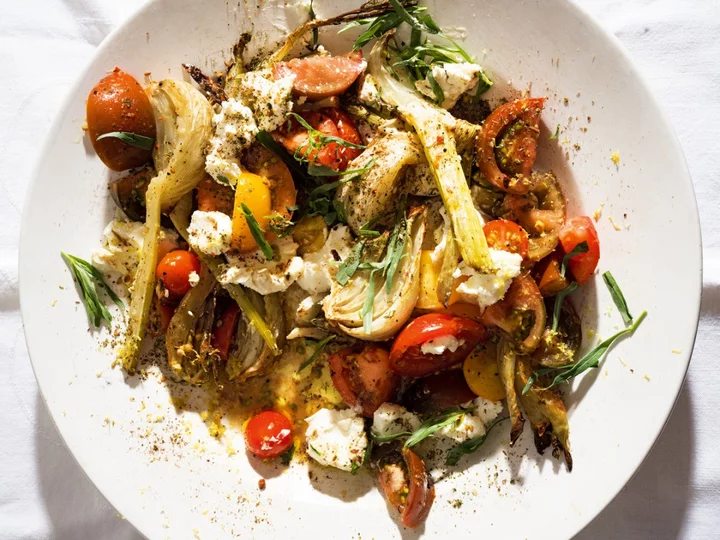
Splash out for this heritage tomato, fennel and dukkah salad
Make this in summer when the tomatoes are at their best,” suggests Imad Alarnab. “The better the tomato, the better this will taste, so splash out and get the good ones.” Heritage tomato, fennel and dukkah salad Serves: 2 as a main or 4 as a side Ingredients: 1 fennel bulb 2 tbsp olive oil 1 tsp za’atar 300g assorted heritage tomatoes, cut into chunks 2 tbsp good-quality extra virgin olive oil Grated zest and juice of ½ lemon 2 tbsp dukkah 150g soft goat’s cheese Small handful of fresh tarragon leaves Salt Method: 1. Preheat the oven to 200C/fan 180C/gas 6. 2. Cut the fennel bulb into 6-8 wedges, depending on how large your fennel is. Toss in the olive oil, za’atar and salt to taste, place on an oven tray and roast for 25-30 minutes until soft, slightly crisp and golden. Set aside to cool slightly. 3. Toss the tomatoes in a little salt and the extra virgin olive oil, lemon zest and juice, and dukkah. Roughly crumble the cheese and place on a large serving plate, followed by the roasted fennel and then the tomatoes. Finish with the tarragon leaves. Imad’s Syrian Kitchen by Imad Alarnab (HQ, £26). Read More The National Portrait Gallery’s new restaurant is fabulous upgrade The dish that defines me: Alex Outhwaite’s Vietnamese bun cha 3 TikTok-approved recipes for picnic season Imad Alarnab: In Calais’ Jungle refugee camp, food restored our faith It’s easier to make baklava at home than you might think Make this Middle Eastern lamb shoulder for your next Sunday roast
2023-07-19 21:19

Kim Kardashian’s Skims is now worth $4bn
Kim Kardashian’s shapewear company Skims is now worth US$4bn (approximately £3.09bn) after a new funding round raised US$270m (£209m). This makes Skims a unicorn company four times over. A unicorn company refers to startup companies with a value of more than $1bn. The company, co-owned by Kardashian, 42, and her business partner Jens Grede, plans to announce its new valuation today (Wednesday 19 July), according to the New York Times. Its previous valuation given by investors was $3.2bn. The reality TV star, best known for starring in 20 seasons of Keeping Up With The Kardashians and The Kardashians, said in an interview: “It has grown quickly and we’re so proud of that. We’ve had a really good flow of product launches.” Kardashian launched Skims in 2019 as she wanted to create shapewear that fits her own skin tone and body type. The brand has since released numerous ranges, including loungewear, maternity wear and swimwear. In 2021, the success of the brand increased Kardashian’s net worth to US$1bn, which earned her a spot on Forbes’ World Billionaires List. Last year, when Skims hit its US$3.2bn valuation, it was estimated that Kardashian became US$600m richer. The company secured US$240m in a funding round led by hedge fund Lone Pine Capital, as well as previous investors. Grede, who is Skims’s chief executive, said in an interview that the company was now profitable and on track for US$750 million in sales this year, up from US$500 million in 2022. Grede said nearly 70 per cent of the company’s overall customers are millennials or Gen Zs, while about 15 per cent of the company’s online customers come from outside of the US. Over the last year, he said that 11 million people have joined waiting lists to buy the brand’s most popular items, which regularly sell out. Skims’ bestseller products include its viral “seamless sculpt bodysuit”, which comes with extra compression at the core and waist areas to create a “figure-enhancing” look. The product description says the bodysuit will “flatter your bust, and rounded butt pockets for a lifted look”. Another bestseller is the “soft lounge long slip dress”, a basic maxi slip dress with a body-hugging fit. For a recent collection launched by the brand, British singer-songwriters Raye and PinkPantheress were enlisted to promote it, along with Bronx rapper Ice Spice. The Kardashian family are also responsible for a myriad of viral beauty and fashion companies. Kim also owns a skincare brand named SKKN BY KIM, which sells a nine-product step-by-step routine for “radiant skin”. Kim’s half-sister, Kylie Kenner, is the founder of beauty brand Kylie Cosmetics, which sells makeup and skincare products. Meanwhile, Khloe Kardashian is the co-founder of Good American, a self-claimed “fully inclusive fashion brand” and Kendall Jenner owns the alcohol brand 818 Tequila. Read More Between Brexit and Covid, London’s food scene has become a dog’s dinner – can it be saved? Influencer Annabelle Ham dies at age 22: ‘A light to the world’ Cruise line apologises after passengers witness dozens of pilot whales being slaughtered Woman claims Skims bodysuit ‘saved’ her life after she was shot four times TikTokers are showing off pink outfits they’re going to wear to watch Barbie movie Florence Pugh’s fans praise star for saving Emily Blunt from wardrobe malfunction
2023-07-19 21:17
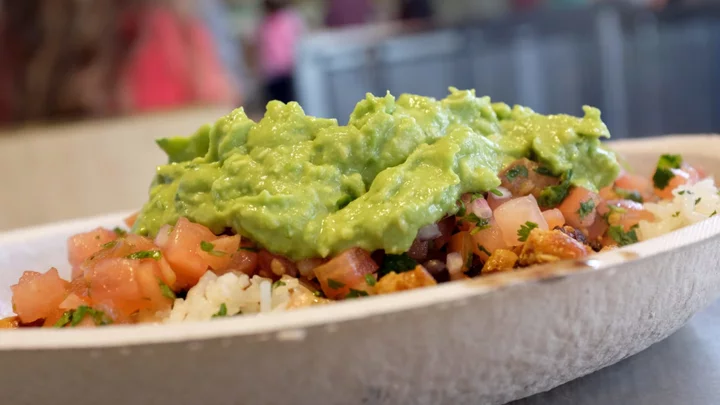
Autocado: Chipotle’s New Guacamole Robot Cuts, Cores, and Peels Avocados
Chipotle’s ‘Autocado’ takes the drudgery out of making guacamole.
2023-07-19 21:16

Jamie Lee Curtis is working on a new children's book, 'Just One More Sleep,' for January publication
Oscar winner Jamie Lee Curtis also has a busy career as a children’s author
2023-07-19 20:47
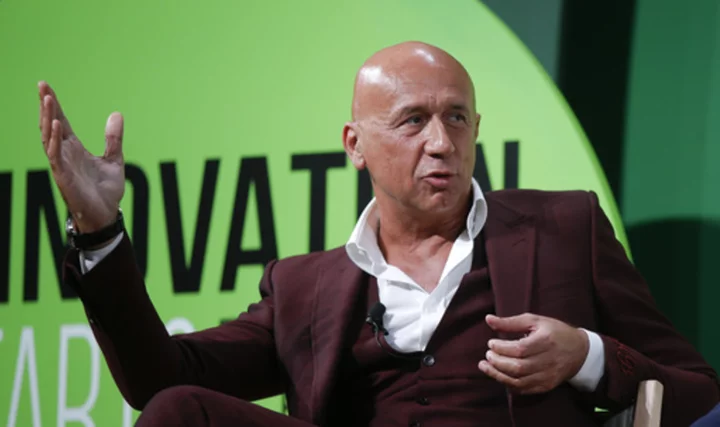
Gucci's CEO is stepping down as its French parent shakes up leadership
The president and CEO of Gucci is stepping down later this year
2023-07-19 19:25
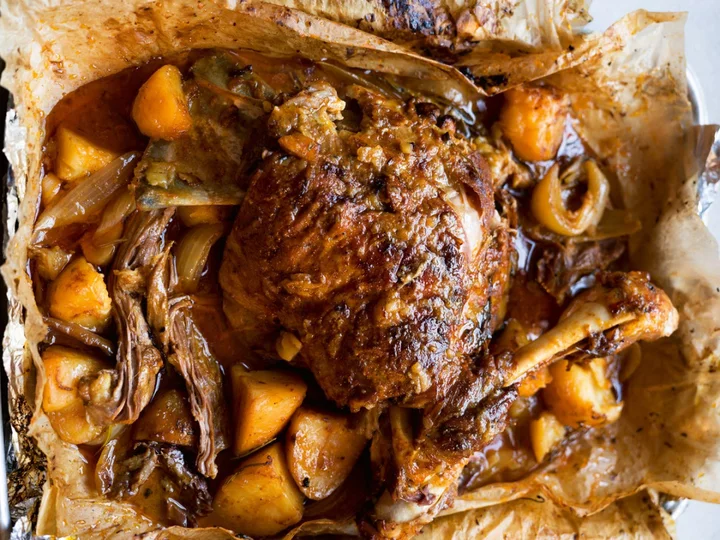
Make this Middle Eastern lamb shoulder for your next Sunday roast
A crowd-pleasing dish to serve up for a family meal or dinner party, Imad Alarnab’s Kataf Ghanam recipe hails from Syria. Kataf Ghanam (lamb shoulder) Serves: 4-6 Ingredients: For the marinade: 5 garlic cloves, grated 2 tbsp smoked paprika 1 tbsp mild Madras curry powder ½ tbsp ground black pepper 3cm piece of fresh ginger, grated 1 tbsp baharat (a spice mix blend) Juice of 1 lemon 1 tbsp tomato purée 2 tbsp red pepper paste Good pinch of salt 150ml olive oil For the lamb: 1.5-2kg lamb shoulder, bone in 10 garlic cloves, peeled 4 sprigs of thyme 4 sprigs of rosemary Method: 1. Mix together all the marinade ingredients in a large container. Rub the marinade all over the lamb so it’s completely covered. Cover and marinate in the fridge for a minimum of 4 hours, ideally overnight. 2. When you’re ready to cook, preheat the oven to 160C/fan 140C/ gas 3. 3. Take the lamb from the fridge, then get a high-sided oven tray and line with a layer of foil and a layer of baking paper, large enough to cover the lamb. Add the garlic and herb sprigs to the middle, followed by the lamb and all the marinade (you can also add onions, carrots or potatoes at this stage, if you like). Fold the foil and baking paper over the lamb like a parcel, then flip it over and wrap it again in another layer of foil so the lamb is tightly wrapped and there are no gaps. We want to cook the lamb in its own juices, so it’s really important that it’s completely covered at this stage. 4. Place in the oven and cook for 4 hours or until the meat is falling off the bone. Remove from the oven, unwrap, increase the temperature to 200C/fan 180C/gas 6 and roast until browned on top. Serve with kabsa rice or plain bulgur. ‘Imad’s Syrian Kitchen’ by Imad Alarnab (HQ, £26) Read More The National Portrait Gallery’s new restaurant is fabulous upgrade The dish that defines me: Alex Outhwaite’s Vietnamese bun cha 3 TikTok-approved recipes for picnic season Imad Alarnab: In Calais’ Jungle refugee camp, food restored our faith It’s easier to make baklava at home than you might think Get set for Wimbledon with top pastry chef’s strawberry recipes
2023-07-19 19:23
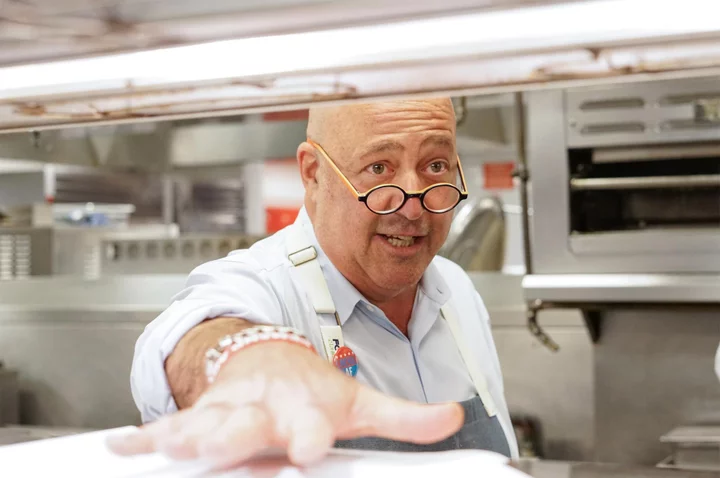
Chef Andrew Zimmern Is Fighting Hunger Caused by Climate Change
“Recently, I was talking to a fisherman in a small town in Italy. His family has been fishing
2023-07-19 17:56
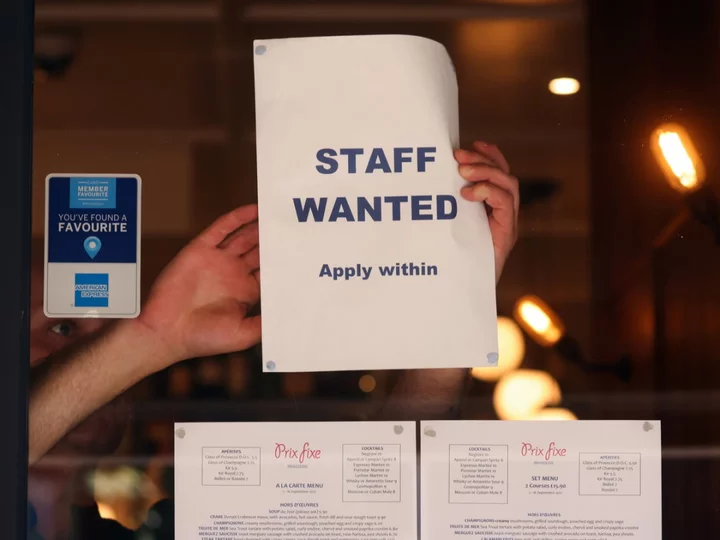
Between Brexit and Covid, London’s food scene has become a dog’s dinner – can it be saved?
London holds a special place in the hearts of food enthusiasts. In the halcyon days of the UK’s place in the European Union, it could even be said that the capital was one of the best cities in Europe – if not the best – for food. Despite it being beaten out by Paris in the Michelin guide (the French capital boasts 119 Michelin stars compared to London’s 74), the city’s sheer diversity made it stand out, with nearly every cuisine under the sun available somewhere in its streets. But recently it hasn’t really felt this way, and the people have noticed. Last week, Lily Allen tweeted: “Having been in New York for most of the time since Covid, I’ve spent long enough away to notice how far the standards have slipped in London’s restaurant scene… Delivery food and takeaways are even worse. Dunno if it’s Brexit or ghost kitchens or inflation or whatever, but it’s a terrible shame.” It’s evident from social media posts and online reviews that a lot of patrons feel the same. The restaurant industry has taken blow after blow in recent years, beginning with the UK’s messy divorce from the EU in 2016. And as it was trying to recover from Brexit, which resulted in increased costs, new bureaucracy and staff shortages, Covid hit. Restaurants were forced to shutter their doors for unknown periods of time, deal with confusing new rules, and magic whole new delivery systems out of thin air. Now, the industry is having to weather the cost of living crisis. In the face of all this, it might be a little cruel to denounce London’s usually thriving food landscape as “mediocre”. But, as painful as it might be, there is some truth to it. Ben Orpwood, a former contestant on the BBC reality series The Great British Menu, tells me that Allen’s observation, while perhaps a bit strongly worded, wasn’t completely wrong about the state of the industry. Orpwood, who was previously the executive chef at Gordon Ramsay’s Lucky Cat, has been cooking in some of the world’s finest kitchens for nearly two decades. But he says he’s never seen anything like the state of affairs at his latest opening, 20 Berkeley in Mayfair. “Normally when you first open a restaurant, the drop-off from the opening team [staff] is something like 20 per cent,” he explains. “You lose people who applied for something they’re not really ready for and opening week is very intense – so they go. But after we opened 20 Berkeley in June, apart from my core team, we had 100 per cent turnover. I’ve never seen anything like it.” He says that staff are leaving even with benefits like getting two meals a day, days and nights off, at least £13.50 an hour for employees with no prior experience, and a nice, conducive kitchen environment to work in – a far cry from the shouting and screaming he endured earlier in his career. “I had a pastry chef that left last week who worked 3pm-11pm, five days a week, no double shifts – he didn’t like how much work there was,” Orpwood marvels. “I can’t get my head around that mentality. The talent and the drive is just not there anymore, there are very few talented young chefs around and all the good restaurants are scrapping over them. When you’re going through that as a new restaurant, it makes it so much harder.” The chef, who has more than two decades of experience under his belt, explains that the aftermath of Brexit and Covid are primarily to blame. Brexit caused an exodus of EU citizens, many of whom questioned whether or not they were welcome in the UK. When Covid hit, more people returned to their home countries and discovered new work opportunities there, opting not to come back to British shores. “Then the government goes, ‘We’ll plug the shortage with young British workers’, except that they introduced needless academic requirements to apprenticeships with a minimum wage that people can’t pay their rent on,” Orpwood adds. The national minimum wage for apprentices aged 21 in their first year is £5.28 an hour, while the average rent for a room in London has rocketed to almost £1k a month. To say that we’re mediocre, I don’t really think it’s a fair reflection Ben Mulock Of course, some industry folk are more optimistic. Ben Mulock, executive chef of Balans, says: “The London food scene for me is still vibrant, it’s still innovative. We still have some great authenticity to it.” However, even the most positive outlook can’t ignore the biggest, most glaring problem restaurants currently face: the skills shortage. “I’ve been cooking since I was 14, and it’s never been like this throughout my entire career,” Mulock laments. “But we are striving and pushing our standards higher to try and give people the experience of years gone by with this new workforce. So, to say that we’re mediocre, I don’t really think it’s a fair reflection.” He adds that people who live in the capital have “some of the most discerning palates globally” and that feeding a London crowd “isn’t an easy thing to please”. “But when you get it right, it’s a wonderful, wonderful feeling,” he says. Perhaps, for anyone who lives outside of London, the bar has been set at an artificial high. Influencers invited to restaurants that have a marketing budget are more likely to post gushing reviews, complete with mouthwatering visuals as they stuff their gobs. Meanwhile, restaurant critics for broadsheets have been recently criticised for platforming establishments in more affluent areas, or only if they’ve been invited. Given some publications don’t pay for reviewers’ meals, this is unavoidable – but it generates a false economy in which readers believe those are the best places to eat. In his essay “London Finds Itself”, Vittles editor Jonathan Nunn wrote about the decline of reviews and the rise of simplified maps that pinpoint places to eat, which also manifests itself in lists. It’s why the algorithm adores those “10 stunning places to eat in London” videos, and why publications are desperate to churn out recommendation lists. He wrote: “The review is too discursive, too expensive to produce, written by people who demand to be paid properly. Far better to shop it all out to a freelancer who can google a bunch of stuff and stitch it together without context.” One has to wonder if this, too, has contributed to restaurants falling short of expectations – perhaps no one is looking closely enough. But Hugh Smithson-Wright, a communications specialist for restaurants, says that the food scene is no more mediocre than it’s ever been; in fact, there have always been plenty of middling eateries around. “Not everyone can be so great,” he says. “Some of my favourite restaurants have been places where food is absolutely fine.” But there’s a distinction to be made here. “Fine is OK if it’s not costing you a lot of money. Expensive is fine if the food is incredible. But now, with everything being so much more expensive for everyone on every income level, the places that are fine are getting more expensive, with smaller portions and cheaper produce, and that’s what we’re not tolerating.” Smithson-Wright points to the fate of Prezzo as a perfect example of this reduced level of tolerance. In April, the Italian restaurant chain closed 46 of its 143 branches and said it was due to soaring energy and food costs – but Smithson-Wright adds that its uninspired food was also a factor. “Prezzo was only fine – it wasn’t great or innovative, but as those prices go up, OK is not good enough. It’s these types of mid-range restaurants, whether chains or independent, that will find they have nowhere to go. They can’t suddenly make their food luxurious, and equally, they can’t suddenly charge the prices they perhaps need to be charging to keep the lights on.” Price is a painful topic right now, resulting in a bitter stand-off between some patrons and restaurateurs. But Britons have historically been averse to paying more for their food, lulled into a false sense of security by the cut-throat price war between supermarkets. Or a sense of: if I can spend less than £5 on a Sainsbury’s ready meal, why are restaurants charging three, four, or five times that for a main course? But, as Smithson-Wright points out, the “bravest thing a restaurant can do is charge what they need to” without fear of empty seats. “In some ways, restaurants punish themselves by not charging what they should and now they’re stuck in a mediocrity trap,” he says. “And they’re not helped by the psychological barrier people have over what they will pay for things.” So what does this mean for the future of food in London? The restaurant industry, as a whole, isn’t about to die any time soon. As Orpwood says, this is a resilient industry and will “just get on with it” until it comes out the other side with hopefully greener grass. Smithson-Wright adds that the current situation sounds a death knell for mid-level restaurants, many of which will not survive this period. But Mullock tries to offer a sunnier disposition. “The London food scene is alive and it’s doing some really good things. Everyone’s just pursuing deliciousness.” Read More Sorry lads, we just can’t afford any more reckless, middle-aged adventurers The dish that defines me: Alex Outhwaite’s Vietnamese bun cha Nappy changes and tantrums over Michael Gove: I took my one-year-old to a music festival Sunak rules out any new EU trade deal that undermines Brexit freedoms Tory MP broke rules over £150,000 loan from Russian businessman What is the future of the Conservative Party?
2023-07-19 13:52
